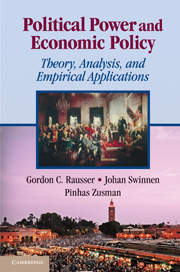Book contents
- Frontmatter
- Contents
- List of Figures
- List of Tables
- Preface
- PART 1 POLITICAL POWER AND ECONOMIC ANALYSIS
- PART 2 IDEOLOGY, PRESCRIPTION, AND POLITICAL POWER COEFFICIENTS
- PART 3 ANALYSIS OF SPECIFIC STRUCTURES
- PART 4 EMPIRICAL APPLICATIONS OF POLITICAL POWER ESTIMATION
- 20 Political Econometrics
- 21 The Political Econometrics of the Israeli Dairy Industry
- 22 Flexible Policy Instruments Given a Political-Power Distribution
- 23 Estimating Statistical Properties of Power Weight Parameters and Their Temporal Shifts
- 24 The Role of Institutions in the Joint Determination of PERTs and PESTs
- References
- Index
24 - The Role of Institutions in the Joint Determination of PERTs and PESTs
Published online by Cambridge University Press: 05 June 2012
- Frontmatter
- Contents
- List of Figures
- List of Tables
- Preface
- PART 1 POLITICAL POWER AND ECONOMIC ANALYSIS
- PART 2 IDEOLOGY, PRESCRIPTION, AND POLITICAL POWER COEFFICIENTS
- PART 3 ANALYSIS OF SPECIFIC STRUCTURES
- PART 4 EMPIRICAL APPLICATIONS OF POLITICAL POWER ESTIMATION
- 20 Political Econometrics
- 21 The Political Econometrics of the Israeli Dairy Industry
- 22 Flexible Policy Instruments Given a Political-Power Distribution
- 23 Estimating Statistical Properties of Power Weight Parameters and Their Temporal Shifts
- 24 The Role of Institutions in the Joint Determination of PERTs and PESTs
- References
- Index
Summary
Introduction
Governments intervene in the economy in many ways. Mueller (2003) distinguishes between “redistributive” and “allocative” policies, while Rausser (1982, 1992) distinguishes between “predatory” and “productive” policies, or PERTs versus PESTs.
There is a vast theoretical and empirical literature on the political economy of redistributive policies, or PERTs, in particular in analyzing distortionary policies in trade and regulations and on analyzing commodity policies in agriculture (see Chapter 12). The literature on the political economy of public goods or PESTs is much less developed. Exceptions are papers by Baland and Kotwal (1998) and de Gorter and Zilberman (1990) on the political economy of public research investments in India and the United States; and by Grossman and Helpman (2005b), Lizzeri and Persico (2004), and Milesi-Ferretti, Perotti and Rostanga (2002), who study the impact of electoral systems on the provision of (local) public goods.
Even fewer studies have analyzed the interaction and joint determination of predatory and productive policies. The main exception in this field is the analysis of the interaction between public investments in agricultural research and extension and producer subsidies and trade distortions in agriculture. Various studies have shown that public investment in agricultural research is an important source of productivity growth (Anderson, Pardey, and Roseboom 1994; Alston, Pardey, and Roseboom 1998). Public research on the corn hybrid seed technology in the United States is a classic example.
- Type
- Chapter
- Information
- Political Power and Economic PolicyTheory, Analysis, and Empirical Applications, pp. 467 - 488Publisher: Cambridge University PressPrint publication year: 2011



